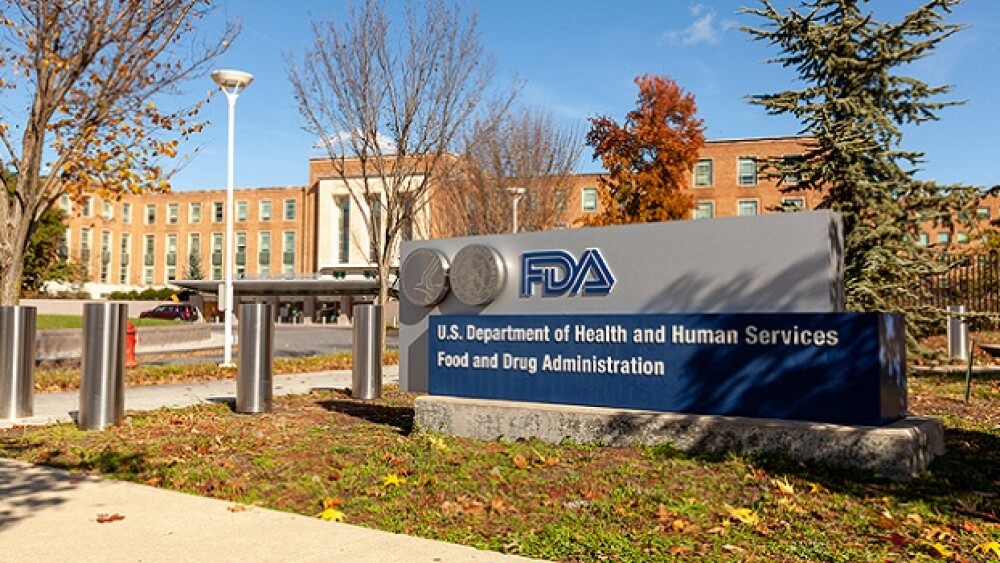A day after the FDA denied Intercept’s application for its non-alcoholic steatohepatitis treatment, the pharma announced it has axed all NASH investments and one-third of its staff.
Pictured: FDA sign in front of building/iStock, Grandbrothers
A day after the FDA denied Intercept Pharmaceuticals’ application for its obeticholic acid tablets to treat patients with pre-cirrhotic liver fibrosis due to non-alcoholic steatohepatitis, the pharma announced it is abandoning the company’s NASH program and laying off about one-third of its workforce.
According to a Friday morning press release, Intercept expects the cuts to save it about $140 million a year, allowing the company to be profitable in 2024. The layoffs will begin in the third quarter of 2023, with most to be completed by the end of 2023.
With all NASH-related investments eliminated, Intercept said it will now focus its R&D efforts on developing a fixed-dose combination of obeticholic acid and bezafibrate to treat primary biliary cholangitis (PBC). It also plans to increase investment in Ocaliva, which it stated is the only FDA-approved second-line treatment for PBC patients.
The company said it is on track to complete a regulatory submission to the FDA in 2023 to fulfill post-marketing requirements for the treatment.
Original article, published 6/23:
FDA’s Second Rejection Ends Intercept’s NASH Aspirations
Thursday, the FDA denied Intercept Pharmaceuticals’ application for its obeticholic acid tablets, which the New Jersey biopharma was proposing to treat patients with pre-cirrhotic liver fibrosis due to non-alcoholic steatohepatitis.
In its Complete Response Letter, the regulator said that Intercept’s New Drug Application for obeticholic acid (OCA) tablets “cannot be approved in its present form,” according to the company’s news release announcing the rejection.
For future submissions, Intercept would require—at the very least—the successful completion of the long-term outcomes part of its Phase III REGENERATE study, assessing OCA tablets in more than 2,400 patients.
The FDA’s verdict is in line with the Gastrointestinal Drugs Advisory Committee’s recommendations. In a meeting last month, the panel of external experts agreed that Intercept had not shown compelling evidence to establish a favorable risk-benefit profile for OCA.
This is the company’s second failed attempt to get OCA approved. The first NDA was filed in 2019, which the FDA accepted in November of the same year. In June 2020, however, the regulator turned down the application, indicating that Intercept’s data package, which relied on surrogate histopathologic endpoints to predict OCA’s efficacy, was not enough to establish that its benefits would outweigh its risks.
Following the initial rejection, Intercept launched REGENERATE, a randomized, double-blinded and placebo-controlled study. Two interim analyses from the study formed the foundation of Intercept’s resubmission, which it filed in December 2022 and which the FDA accepted in January 2023.
This second denial, however, appears to be final. Intercept also announced Thursday it will discontinue all investments and activities related to non-alcoholic steatohepatitis. The company will also kick off a restructuring initiative to reorient its operations and “strengthen its focus on rare and serious liver diseases,” according to the press release.
“We believe that taking decisive action to reshape Intercept will improve our long-term ability to grow our business, innovate for patients, and create value for shareholders,” Intercept CEO Jerry Durso said in a statement.
These realignment initiatives will also put Intercept on “an accelerated path to profitability beginning in 2024,” according to the company’s announcement.
OCA is a farnesoid X receptor agonist that helps prevent the toxic accumulation of bile acid in the liver. The FDA approved the drug in 2016 for the rare liver disease primary biliary cholangitis, for which OCA is marketed under the brand name Ocaliva. The oral drug carries a boxed label to warn against hepatic decompensation and failure.
Tristan Manalac is an independent science writer based in metro Manila, Philippines. He can be reached at tristan@tristanmanalac.com or tristan.manalac@biospace.com.






